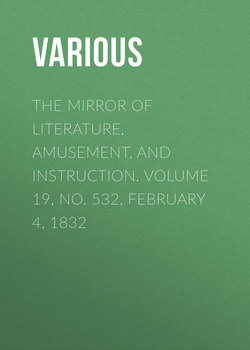The Mirror of Literature, Amusement, and Instruction. Volume 19, No. 532, February 4, 1832

Реклама. ООО «ЛитРес», ИНН: 7719571260.
Оглавление
Various. The Mirror of Literature, Amusement, and Instruction. Volume 19, No. 532, February 4, 1832
ROBERT THE DEVIL
CASTLE OF ROBERT LE DIABLE, OR ROBERT THE DEVIL
CAVERN OF ROBERT LE DIABLE
LACONICS, &c
TRANSLATION OF DELLA CASA'S SONNET TO THE CITY OF VENICE
THE HOUSE OF UNDER
THE SELECTOR; AND LITERARY NOTICES OF NEW WORKS
FRENCH REVOLUTION OF 1830
TIME'S TELESCOPE FOR 1832
NOTES OF A READER
SCOTTISH LITERARY DINNER
RETROSPECTIVE GLEANINGS
LACONIC JUSTICE
FLOATING SCHEME
THE GREEK SAILORS
BILLS OF MORTALITY
TAILORS
HINTS TO COCKNEY EQUESTRIANS
SPIRIT OF THE PUBLIC JOURNALS
BEAUTIES OF THE PILGRIM'S PROGRESS
THE GATHERER
IMPROMPTU.—TO A LADY
FAMILIAR SCIENCE
Отрывок из книги
All the town, and the country too, by paragraph circumstantial, and puff direct, must have learned that every theatre in this Metropolis, and consequently, every stage in the country, is to have its version of the splendid French opera Robert le Diable. Its success in Paris has been what the good folks there call magnifique, and playing the devil has been the theatrical order of day and night since the Revolution. As we know nothing of its merits, and do not write of what we neither see nor hear, nor believe any report of, we do not put up our hopes for its success. But, as the story of the opera is a pretty piece of Norman romance, some fair penciller has sent us the sketches of the annexed cuts, and our Engraver has thus pitted himself with Grieve, Stanfield, Roberts, and scores of minor scene-painters, who are building canvass castles, and scooping out caverns for the King's Theatre, Covent Garden, and Drury Lane Theatres. Theirs will be but candle-light glories: our scenes will be the same by all lights. But as scenes are of little use without actors, and cuts of less worth without description, we append our fair Correspondent's historical notices of the sites and the dram. pers. of "this our tragedy."
The founder of this ancient castle bears the name of Robert the Devil. It is a wonderful relic of old Norman fortification, being so defended by nature, as to bid defiance to its enemies, and could only have fallen by stratagem. It is situated on the left side of the River Seine and in the province of Normandy. The subterranean caverns by their amazing extent sufficiently attest the ancient importance of this structure; tradition says they extend to the banks of the Seine. Its antiquity is fully proved by some of the architectural fragments bearing the stamp of 912. On arriving at the summit of the mountain, the tourist receives an impression like enchantment: the castle seems to have been conveyed there by fairies; and at the base the eye is charmed by the fine and picturesque forest of Bourgtheroulde: villages elegantly grouped, enrich with their beautiful fabrics each bank of the Seine which majestically traverses a luxurious landscape. Romance, fable, and the tradition of shepherds and peasants describe Robert the Devil as Governor of Neustria, and a descendent of Rollo the celebrated Norman chief, whose name was changed to Robert, Duke of Normandy in 923, on his marriage with the daughter of Charles the simple, King of France. His great and valiant achievements are remembered in that country so renowned by his race, and where his name still awakens every sentiment of superstitious awe. All in the environs of the castle recount his wonderful and warlike exploits; his numerous amours; and his rigid penitence by which he hoped to appease the wrath of offended Heaven. The moans of his victims are said to resound in the Northern subterranean caverns; the peasantry also believe that the spirit of Robert is condemned to haunt the ruins of his castle, and the tombs of his "Ladies Fair." In justice to his memory be it remembered, that his acts of cruelty were alone aimed at the rapacious and guilty, and that in him helpless innocence ever found a protector.
.....
In dreaming, it is remarkable how easily and yet imperceptibly the mind connects events altogether differing in their nature; and if we hear any noise during sleep, how instantaneously the sound is woven in with the events of our dream and as satisfactorily accounted.
The unpleasant sensation that is produced by modesty, is amply compensated by the prepossession it creates in our favour.
.....